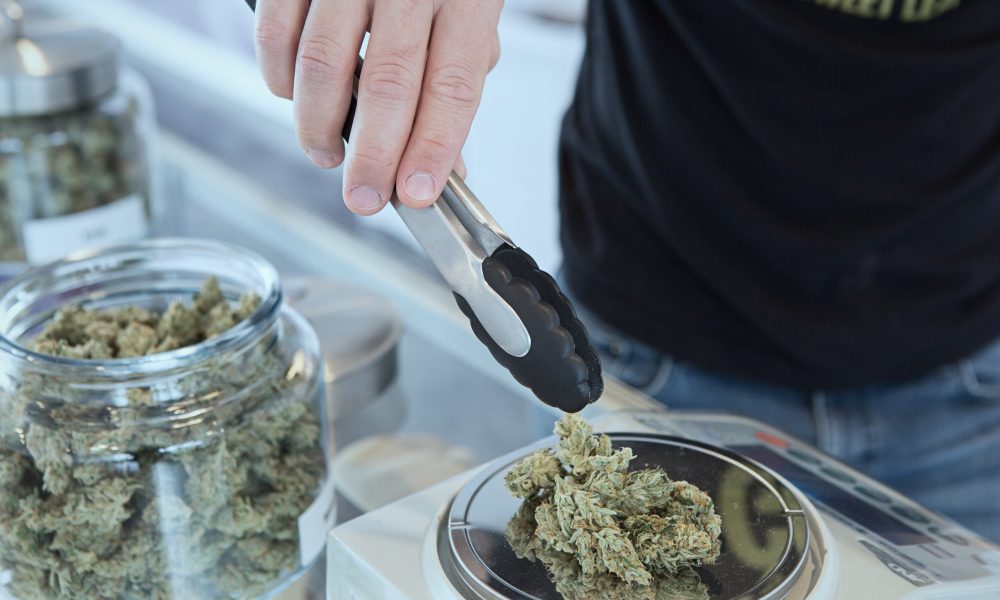New York’s governor and top regulators have announced that the state expects to open a dozen new marijuana shops in December now that a court-imposed blockade on processing licenses has been lifted.
This represents a significant expansion on a relatively short timeline, as New York’s Office of Cannabis Management (OCM) has only licensed 34 retailers to date since legalization took effect.
“As New York expands the most equitable cannabis market in the nation, my administration remains committed to building a safe industry for all New Yorkers that will grow our small business community,” Gov. Kathy Hochul (D) said in a press release on Thursday.
“These new dispensaries continue our mission of strengthening our legal market while at the same time helping to push out the bad actors who skirt our laws and undermine all we are trying to accomplish,” she said.
The governor’s office announced that several new dispensaries will open over the next two weeks following the state Supreme Court approving settlement agreements for lawsuits that had blocked them from licensing hundreds of retailers since August.
Those dispensaries will be located in the Bronx, Manhattan, Brooklyn and Long Island. Another retailer is set to open in Manhattan in early January.
This follows the opening of two additional adult-use retailers supported by the New York Cannabis Social Equity Investment Fund in Albany and Troy last week—days after the court-imposed injunction ended.
Cannabis Control Board (CCB) Chair Tremaine Wright said in a LinkedIn post on Wednesday that the state is “poised to open a dozen new dispensaries before December 31st.”
“And we are celebrating the success of our Social Equity licensees,” she said. “New York has opened the legal market with people who were disproportionately impacted by over-policing and divestment during cannabis prohibition.”
OCM Executive Director Chris Alexander said that December is “going to be a busy and exciting month for New York cannabis as over a dozen licensees finally get the chance to open their doors for business.”
“What’s particularly heartening is not just seeing these stores open, but seeing who is operating them. Before the end of the year, we will have 12 Black-owned dispensaries operating and 5 Hispanic-owned dispensaries,” he said. “Considering the national landscape, where Black and brown ownership in cannabis is exceedingly rare, I am incredibly proud of this result. This isn’t just about numbers; it’s a clear indication of our dedication to creating a more equitable and inclusive cannabis industry.”
As regulators process the backlog of hundreds of conditional retailer licenses, they’re also actively accepting additional applications for both recreational shops and medical cannabis dispensaries for the next few days.
Meanwhile, amid the state’s protracted legalization rollout, illicit cannabis operators have proliferated across New York, prompting the governor to announce that they would be “ramping up” enforcement.
In October, the New York Senate Cannabis Subcommittee, which was established in April and is being chaired by Sen. Jeremy Cooney (D), heard from witnesses and discussing potential legislative solutions to the state’s ongoing cannabis legalization implementation problems.
Meanwhile, Hochul recently signed legislation that attempts to make it somewhat easier for financial institutions to work with state-licensed cannabis clients.
She also signed a separate bill that’s meant to provide tax relief to New York City marijuana businesses that are currently blocked from making federal deductions under an Internal Revenue Service (IRS) code known as 280E.
While Hochul signed a an earlier budget bill last year that included provisions allow state-level cannabis business tax deductions—a partial remedy to the ongoing federal issue—New York City has its own tax laws that weren’t affected by that change. The new measure is meant to fill that policy gap.
However, the governor vetoed a pair of bills last week that would have allowed hemp seeds to be included in animal feed for pets, horses and camelids such as llamas and alpacas—citing a lack of information about the safety of such uses, which she wants the state to study in an “expeditious manner.”
As part of the state’s effort to speed consumer access to legal marijuana, regulators also launched a program, known as the Cannabis Growers Showcase (CGS), an initiative of OCM that allowed licensed growers and processors to sell directly to consumers. That program has since ended, but a key Assembly lawmaker says he will be filing legislation meant to extend it.
In September, 66 state lawmakers—about a third of the entire state legislature—also wrote to Hochul urging her to sign a bill that would allow licensed marijuana producers to sell products to tribal retailers. The plan would offer a release valve to hundreds of cannabis farmers who are currently sitting on surpluses but have no place to sell their products.
Meanwhile, New York regulators are working to debunk what they say is the “false” narrative that cannabis is commonly contaminated with fentanyl—a “misconception” that remains “widespread” despite a lack of evidence. OCM recently put out a factsheet on the issue, acknowledging that while fentanyl has been found in drugs like MDMA and heroin, anecdotal claims about marijuana laced with the potent opioid are so far unfounded.
The state’s Office of Addiction Services and Supports (OASAS) also recently revised guidance around THC testing for people in treatment for substance use disorder, advising marijuana screening only in cases where “the patient has identified a reduction in, or cessation of cannabis as part of their treatment goals.”
Last month, on the post-Thanksgiving Black Friday, regulators encouraged people to take advantage of the deals and support small businesses by shopping for cannabis at licensed retailers.
California Senator Says State Is At Psychedelics ‘Inflection Point’ As He Plans Dialed-Back, Therapeutic-Focused Bill
Read the full article here









